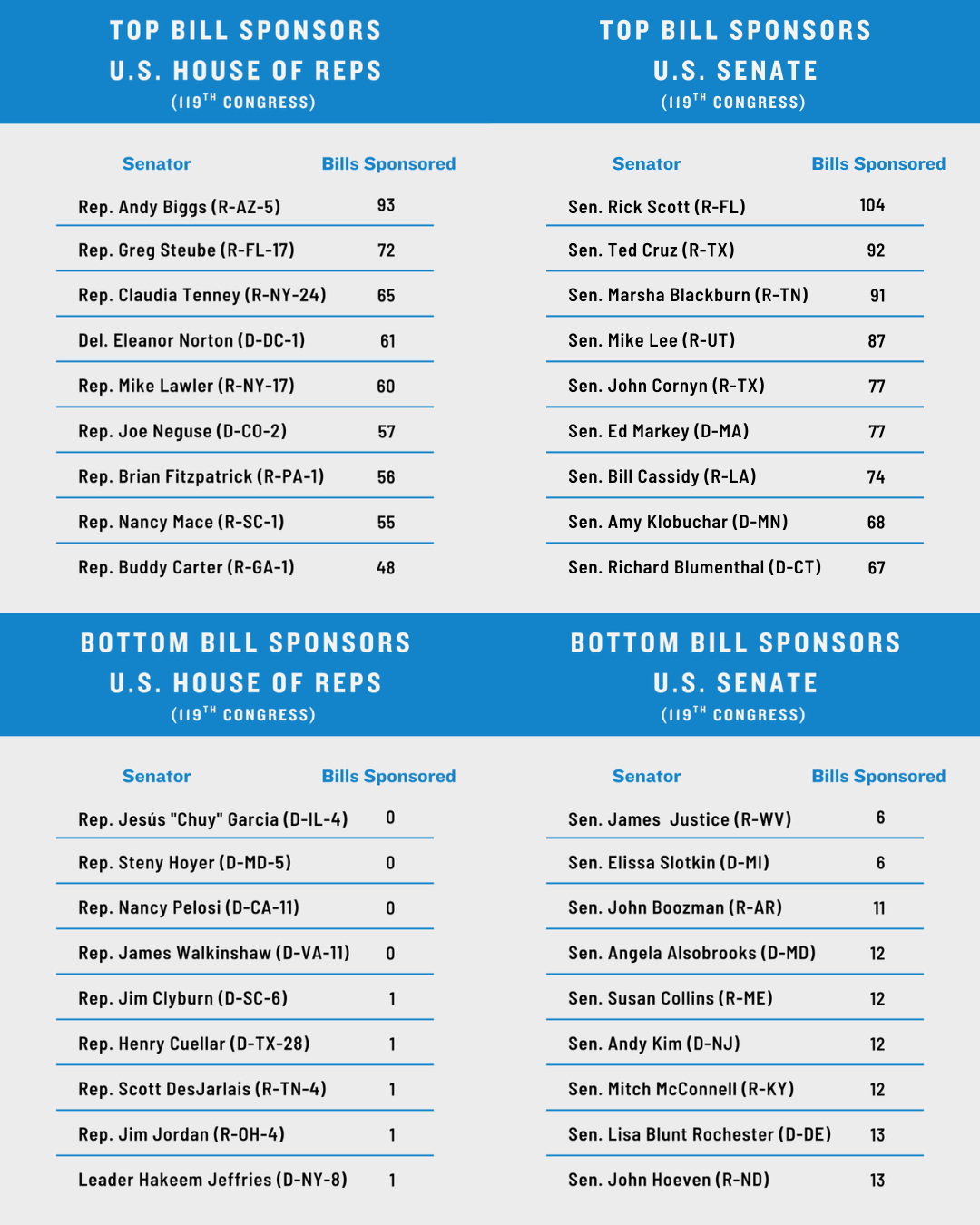Don't be fooled when a lawmaker brags about introducing legislation
Plus, the Senators and Reps. who sponsor the MOST and FEWEST number of bills
On March 29, 2023, the chamber of the House of Representatives looked like any other day: a few members milling about, clerks organizing papers, CSPAN cameras blinking to life. Business as usual.
That is until Rep. Andy Biggs (R-AZ) decided to carpet bomb the legislative docket.
Over the course of just a few minutes, Biggs introduced 521 separate bills. Five hundred. Twenty. One. Separate. Bills.
Check the Congressional Record from that day. Each entry begins the same way: “Mr. Biggs introduced the following bill…”
And then another. And another, effectively spamming the chamber and it’s clerks with legislation.
And what were these 500+ bills? They weren’t sweeping economic reforms or bold new climate policies. Nearly all of them had identical language, aiming to repeal individual provisions of the 2021 Bipartisan Infrastructure Law—a kind of one-man scorched-earth campaign against federal spending.
To be clear, no hearings were held on any of these bills. No debates were scheduled. The bills weren’t meant to become law. They were meant to make a point.
It was part protest, part press release, part procedural overload. And most importantly, it was a vivid reminder of a truth about Congress that’s often overlooked:
Introducing a bill doesn’t mean much.
Anyone can do it. At any time. For any reason.
“I Introduced a Bill That…”
You’ve probably heard a lawmaker boast that they ‘introduced a bill that…’—on cable news, in constituent newsletters, at town halls, during political debates. It’s political catnip.
And they say it to distract you.
Introducing a bill sounds important. It’s tangible. It shows action that only an elected member of Congress can take. I mean, I can’t introduce a bill in Congress—can you? Doing so is a great talking point; it puts your name in the news.
But ,here’s the truth most civics classes skip: introducing a bill can be one of the easiest things a lawmaker can do. And it often is.
Any member of Congress—no matter how junior or senior, powerful or powerless—can introduce a bill at virtually any time. But that’s usually where the action stops. After the press release goes out and the headline is written, the vast majority—about 95%—quietly die right there, never receiving a hearing, a vote, or even a second glance.
And the range of what qualifies as a “bill” is staggering.
Some are a single page long—like those that rename post offices, designate commemorative days, or make minor technical corrections to existing law. Others are thousands of pages, sprawling rewrites of the tax code, health care, or energy systems. Some take years of negotiation and expert drafting. Others can be dashed off via copy/paste by a single staffer before lunch.
That’s why simply hearing that a lawmaker “introduced a bill” tells you almost nothing about its substance, significance, or likelihood of becoming law. One might be the product of a coalition of policy experts, committee lawyers, and advocacy groups; another could be a symbolic protest designed to get a headline and then be forgotten.
So while bill introductions sound impressive—and lawmakers love to brag about them—they’re often the easiest and least meaningful legislative action available to a member of Congress.
Who’s Introducing the Most Bills?
Let’s look at the numbers for the current 119th Congress to date.
At first glance, you might think: “Wow, some these lawmakers must be incredibly productive!” And, of course, ‘Mr. 521’ himself, Rep. Biggs leads the House in introductions so far this Congress.
Maybe. But remember—this is a count of introductions, not what happened to the bills after they are thrown in the hopper.
Though there are exceptions, most members of Congress do want to introduce at least some bills each session. Even if those bills have no real shot at becoming law, members know they’ll eventually need to point to official legislative text or get hammered for not doing their job.
In this line of work, introducing nothing can raise more eyebrows than introducing something that goes nowhere.
But the sheer number of bill introductions hides a bigger truth: like much in life, don’t confuse quantity with quality.
Bills that have any chance of passing—especially in a polarized Congress—take serious effort. Drafting substantive legislation requires research, stakeholder outreach, legal vetting, coalition building, committee negotiations, and often, a willing partner across the aisle. In other words: time, energy, and political capital.
On the flip side, when you see huge counts of introduced bills (especially when the member themselves is doing the bragging) remember this: Often, the point isn’t to legislate; it’s to be able to say you legislated. There’s a world of difference between those two statements.
So, when politicians tell you they “introduced a bill,” ask:
Did it pass?
Was it bipartisan?
Did it get a hearing?
Or was it simply a press release with a legislative number?
These simple questions can cut through a lot of politician speak.




Thank you for this explanation/clarification. This information will be helpful as a basis for researching the truth about how my congressmen use the news to boost themselves up by sponsoring legislation that goes nowhere. When they have done nothing to really support their constituents, they need to be called out. Truth is always a good way to try to persuade people to call out their congressmen.